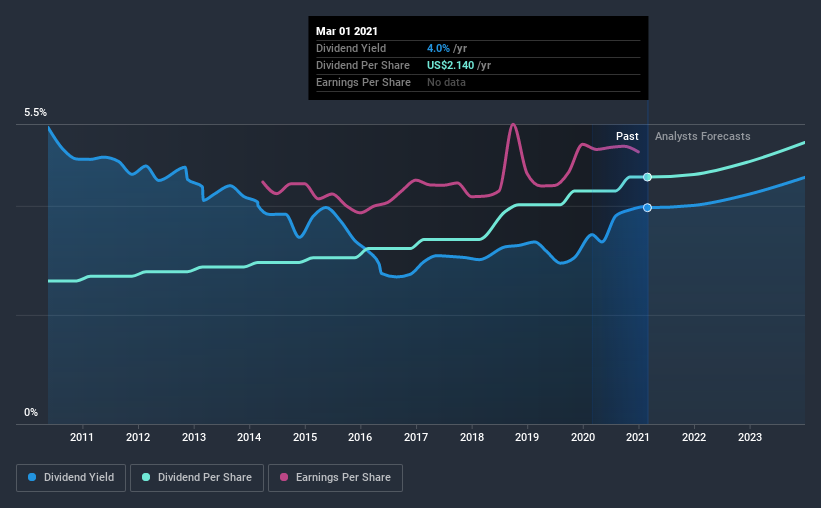Dividend Investors: Don't Be Too Quick To Buy Evergy, Inc. (NYSE:EVRG) For Its Upcoming Dividend
Readers hoping to buy Evergy, Inc. (NYSE:EVRG) for its dividend will need to make their move shortly, as the stock is about to trade ex-dividend. You can purchase shares before the 5th of March in order to receive the dividend, which the company will pay on the 22nd of March.
Evergy's next dividend payment will be US$0.54 per share, on the back of last year when the company paid a total of US$2.14 to shareholders. Calculating the last year's worth of payments shows that Evergy has a trailing yield of 4.0% on the current share price of $53.96. We love seeing companies pay a dividend, but it's also important to be sure that laying the golden eggs isn't going to kill our golden goose! We need to see whether the dividend is covered by earnings and if it's growing.
See our latest analysis for Evergy
Dividends are typically paid out of company income, so if a company pays out more than it earned, its dividend is usually at a higher risk of being cut. It paid out 75% of its earnings as dividends last year, which is not unreasonable, but limits reinvestment in the business and leaves the dividend vulnerable to a business downturn. It could become a concern if earnings started to decline. Yet cash flows are even more important than profits for assessing a dividend, so we need to see if the company generated enough cash to pay its distribution. Over the last year, it paid out dividends equivalent to 240% of what it generated in free cash flow, a disturbingly high percentage. Unless there were something in the business we're not grasping, this could signal a risk that the dividend may have to be cut in the future.
While Evergy's dividends were covered by the company's reported profits, cash is somewhat more important, so it's not great to see that the company didn't generate enough cash to pay its dividend. Cash is king, as they say, and were Evergy to repeatedly pay dividends that aren't well covered by cashflow, we would consider this a warning sign.
Click here to see the company's payout ratio, plus analyst estimates of its future dividends.
Have Earnings And Dividends Been Growing?
Stocks in companies that generate sustainable earnings growth often make the best dividend prospects, as it is easier to lift the dividend when earnings are rising. If earnings fall far enough, the company could be forced to cut its dividend. With that in mind, we're encouraged by the steady growth at Evergy, with earnings per share up 5.2% on average over the last five years. Earnings have been growing at a steady rate, but we're concerned dividend payments consumed most of the company's cash flow over the past year.
The main way most investors will assess a company's dividend prospects is by checking the historical rate of dividend growth. Since the start of our data, 10 years ago, Evergy has lifted its dividend by approximately 5.6% a year on average. It's encouraging to see the company lifting dividends while earnings are growing, suggesting at least some corporate interest in rewarding shareholders.
To Sum It Up
Is Evergy worth buying for its dividend? Earnings per share have grown somewhat, although Evergy paid out over half its profits and the dividend was not well covered by free cash flow. With the way things are shaping up from a dividend perspective, we'd be inclined to steer clear of Evergy.
Although, if you're still interested in Evergy and want to know more, you'll find it very useful to know what risks this stock faces. To help with this, we've discovered 1 warning sign for Evergy that you should be aware of before investing in their shares.
If you're in the market for dividend stocks, we recommend checking our list of top dividend stocks with a greater than 2% yield and an upcoming dividend.
This article by Simply Wall St is general in nature. It does not constitute a recommendation to buy or sell any stock, and does not take account of your objectives, or your financial situation. We aim to bring you long-term focused analysis driven by fundamental data. Note that our analysis may not factor in the latest price-sensitive company announcements or qualitative material. Simply Wall St has no position in any stocks mentioned.
Have feedback on this article? Concerned about the content? Get in touch with us directly. Alternatively, email editorial-team (at) simplywallst.com.


